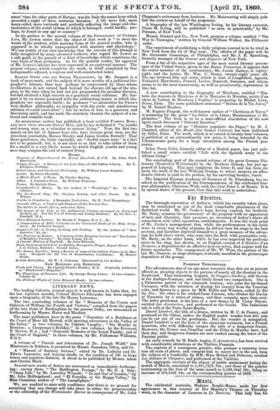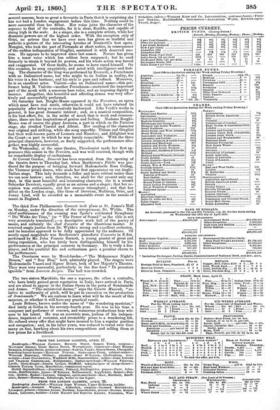311noir.
The celebrated contralto, Madame Borghi-Mamo, made her first appearance in this country at Her Majesty's Theatre on Thursday week, in the character of Leonora in La Favorite. This lady has, for
several seasons, been so great a favourite in Paris that it is surprising she has not had a London engagement before this time. Nothing could be more successful than her debut. Her voice joins the character of the soprano to that of the contralto, for it is clear, flexible and capable of i
rising high in the scale. As a singer, she a complete artiste, while her dramatic powers are of the highest order. With the exception only of Grisi, no actress that we have ever seen has given so truthful and pathetic a picture of the interesting heroine of Donizetti's best opera. Mongini, who took the part of Fernando at short notice, in consequence of the sudden indisposition of Giuglini, sustained it with deserved suc- cess. He appears to be improved since last season. Nature has given him a tenor voice which has seldom been surpassed; but he used formerly to strain it beyond its powers, and his whole action was forced and exaggerated. Of these faults, he seems to have cured himself. On this occasion, he sang exquisitely, and acted with intelligence and feel- ing. The character of the king was performed by Everardi, a Frenchman with an Itationized name, but who might be an Italian in reality, for his voice is a fine baritone, and his style is pure and refined. Moreover, he is an excellent actor. Vialetti-also an Italianized name-this per- former being M. Vialette-another Frenchman-sustained the important part of the monk with a sonorous bass voice, and an imposing dignity of manner. Altogether, this beautiful and affecting drama was very effec- tively and successfully performed. On Saturday last, Borghi-Mamo appeared in the Trovatore, an opera which must have real merit, otherwise it could not have retained its popularity after being so excessively hackneyed. Like Verdi's works in general, it has great dramatic interest ; and, as a musical composition, is his best effort, fort in the midst of much that is weak and common- place, there are fine inspirations of genius and feeling. Madame Borghi- Mamo was of course the gipsy Azucena, a part in which on the Parisian stage, she rivalled Viardot and Alboni. Her reading of the character was original and striking, while she sang superbly. miens and Giuglini had their well-known parts of Leonora and Manrico ; and Aldighieri was the Count-a part in which he was barely respectable. With the three principal characters, however, so finely supported, the performance alto- gether, was highly successful.
On Wednesday, at the same theatre, Piccolomini made her first ap- pearance this season in the Traviata, and was well received, though with no remarkable display of enthusiasm.
At Covent Garden, Dinorah has been repeated, from the opening of the theatre down to Thursday last, when Beethoven's Yitlelio was pro- duced for the purpose of bringing forward Mademoiselle Rosa Csillag, the Viennese prima donna, who made her first appearance on our Anglo- Italian stage. This lady demands-a fuller and more critical notice than we can now bestow; and, therefore, we shall for the' present only say that, in this most beautiful and interesting character, she is a second Schroeder Devrient, equally great as an actress and a singer; that her re- ception was enthusiastic, and her success triumphant ; and that her debut on the London stage, like those of Devrient, Malibran, Grisi and Jenny Lind, will be recorded as a memorable event in the annals of music in England.



























 Previous page
Previous page